
Sociologia Nauki i Tehnologij-Sociology of Science & Technology
metrics 2024
Investigating the Interplay Between Science, Technology, and Community
Introduction
Sociologia Nauki i Tehnologij-Sociology of Science & Technology is a distinguished journal dedicated to exploring the intricate relationships between science, technology, and society. Published by the Institute of History of Science and Technology, Saint Petersburg Branch, Russian Academy of Sciences, this journal serves as a vital platform for interdisciplinary research and discourse within the fields of sociology, science studies, and technology assessment. The journal encourages contributions that delve into the societal implications of scientific advancements and technological innovations, making it essential reading for researchers, professionals, and students alike. Although specific impact factors and access options are currently not provided, the journal is committed to maintaining high academic standards and fostering a rich scholarly community. Join us in advancing the understanding of how science and technology shape human experiences across diverse contexts.
Metrics 2024
 -
- 0.20
0.20 0.20
0.20 -
-Metrics History
Rank 2024
IF (Web Of Science)
JCI (Web Of Science)
Quartile History
Similar Journals

Journal of Scientometric Research
Connecting researchers to the forefront of scientometric discovery.The Journal of Scientometric Research is a pivotal publication in the fields of Computer Science Applications, Information Systems, and Library and Information Sciences, published by PHCOG NET. This journal, with ISSN 2321-6654 and E-ISSN 2320-0057, serves as a vital platform for scholars and practitioners seeking to disseminate and engage with cutting-edge research from 2019 through 2024. It occupies a noteworthy position with its 2023 category quartiles, reflecting its growing influence—ranking in Q3 for Computer Science Applications and Information Systems, and Q2 in Library and Information Sciences. The journal's Scopus rankings further emphasize its relevance, performing particularly well within the social sciences domain. Researchers, professionals, and students are encouraged to take advantage of this open-access journal, contributing to the advancement of knowledge and collaboration within the diverse intersection of these fields.
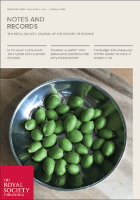
Notes and Records-The Royal Society Journal of the History of Science
Illuminating the Evolution of Scientific ThoughtNotes and Records - The Royal Society Journal of the History of Science is an esteemed scholarly journal published by the Royal Society in the United Kingdom, focusing on the historical aspects of science and its impact on modern scientific practices. With an ISSN of 0035-9149 and E-ISSN 1743-0178, this journal serves as a vital platform for researchers, professionals, and students who seek to explore the intricate connections between historical developments and contemporary scientific discourse. Recognized for its academic rigor, it holds a commendable position in the Q3 category of the History and Philosophy of Science field, ranking #56 out of 223 according to Scopus, and showcasing a 75th percentile ranking. Covering converged years from 1970 to 1973 and from 1975 to 2024, the journal publishes articles that contribute significantly to the understanding of the evolution of scientific thought. While it currently does not operate under an open access model, its esteemed content continues to engage a broad readership, fostering a deeper appreciation for the history behind scientific innovation and inquiry.

Spontaneous Generations-Journal for the History and Philosophy of Science
Fostering Dialogue on the Evolution of Scientific IdeasSpontaneous Generations: Journal for the History and Philosophy of Science is a dedicated publication focusing on the rich fields of history and philosophy within the scientific domain. Published by the Institute for the History and Philosophy of Science and Technology, this journal provides a vital platform for scholars, researchers, and students to explore and disseminate ideas that bridge the historical context and philosophical inquiries of scientific practices. With its commitment to open access, Spontaneous Generations ensures that groundbreaking research is widely available, fostering an environment of collaboration and knowledge sharing. Aiming to engage a diverse audience, this journal is pivotal for those looking to understand the evolution of scientific thought and its implications on contemporary issues, making it an essential resource in the academic community.

Conservation Letters
Elevating Voices in the Pursuit of Environmental SolutionsConservation Letters, published by Wiley, is a premier peer-reviewed journal dedicated to advancing the field of conservation science. As an Open Access journal since 2015, it provides researchers, practitioners, and policymakers with immediate access to cutting-edge research and insights that shape effective conservation strategies globally. With an impressive impact factor and a distinguished standing in the academic community—ranking in the Q1 category in disciplines such as Ecology, Evolution, and Nature Conservation—the journal plays a vital role in disseminating high-quality research that informs environmental practices. Based in the United States, it encompasses a broad scope of topics aimed at bridging scientific findings with real-world applications, effectively contributing to the understanding and preservation of biodiversity. Researchers looking to publish innovative work in an influential platform will find Conservation Letters an essential venue for ensuring their research reaches an engaged international audience.
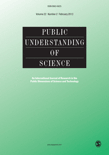
PUBLIC UNDERSTANDING OF SCIENCE
Fostering Understanding Through Scholarly ResearchPUBLIC UNDERSTANDING OF SCIENCE, published by SAGE PUBLICATIONS LTD, stands as a crucial multidisciplinary journal dedicated to exploring the intricate relationship between science and society. With its well-established history from 1992 through to 2024, this journal offers an essential platform for researchers, professionals, and students interested in the communication of scientific knowledge and its impact on public perception. Recognized for its high academic standards, it proudly holds a Q1 ranking in the categories of Arts and Humanities, Communication, and Developmental and Educational Psychology, signifying its significant influence and contribution to these fields. The journal’s impressive percentile rankings further underscore its vital role in advancing scholarship, interaction, and understanding in the public discourse of science. Although it does not currently offer open access options, the journal is committed to disseminating scholarly research that informs and enriches the dialogue on critical scientific issues, making it a pivotal resource for anyone engaged in or studying the dynamics of science communication.
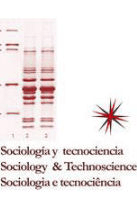
Sociologia y Tecnociencia
Exploring the Social Impact of Technological Change.Sociologia y Tecnociencia is a pivotal academic journal published by the Universidad de Valladolid, Departamento de Sociología y Trabajo Social, focusing on the interdisciplinary dynamics between sociology and technology. Since its inception, the journal has embraced an Open Access model since 2011, promoting knowledge dissemination and accessibility to a broader audience. Based in Spain, it addresses contemporary issues spanning social development, health sociology, and the management of technological innovations. With its impact factor reflective of its community engagement and scholarly contribution, the journal is categorized in various quartiles, including Q4 in Development, Q4 in Health (Social Science), and Q3 in Sociology and Political Science (2023). The journal's Scopus rankings, while modest, demonstrate a commitment to increasing visibility and relevance in the burgeoning fields of sociological research and technological influence. By publishing rigorous studies and thought-provoking discussions, Sociologia y Tecnociencia aims to foster critical inquiry and collaboration among researchers, professionals, and students alike, contributing to the evolution of sociological and technological scholarship.
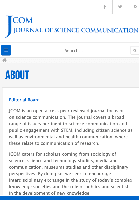
JCOM-Journal of Science Communication
Unlocking Knowledge: Engaging the Public in ScienceJCOM - Journal of Science Communication is a premier, peer-reviewed journal dedicated to enhancing the dialogue between science and society. Established in 2002 by the Scuola Internazionale Superiore di Studi Avanzati in Italy, it has become an essential platform for research in the field of science communication, reflecting the growing importance of effective communication in the advancement of scientific knowledge. The journal boasts an impressive Open Access model, encouraging widespread dissemination of critical research findings. With a notable impact in the Communication category, ranking in the Q2 quartile, and achieving a remarkable 77th percentile in Scopus ranks, JCOM positions itself as a crucial resource for scholars, professionals, and students alike. With a broad scope covering interdisciplinary aspects of science communication, the journal aims to foster innovative research and discussions that bridge the gap between scientific communities and the public. Located in Trieste, Italy, JCOM invites contributions that elevate the standards and practices of communicating science in an increasingly complex world.
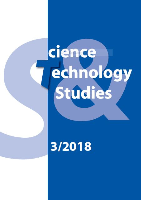
Science and Technology Studies
Advancing Knowledge Through Open Access ResearchScience and Technology Studies, an esteemed journal published by the Finnish Society for Social Science & Technology Studies, is a leading platform in the fields of History and Philosophy of Science, as well as Multidisciplinary studies. Since transitioning to an Open Access model in 2012, the journal has been committed to disseminating high-quality research accessible to a global audience, fostering international discourse and collaboration. With an impressive Scopus ranking placing it in the top 10th percentile (Rank #22 out of 223) within its categories, it showcases pioneering research and critical analyses that illuminate the complex interplay between science and societal dynamics. Located in Tampere, Finland, the journal serves as an essential resource for researchers, professionals, and students alike, aiming to advance understanding and innovation in science and technology studies through interdisciplinary engagement.

Tapuya-Latin American Science Technology and Society
Exploring the Nexus of Science, Technology, and Society in Latin AmericaTapuya-Latin American Science Technology and Society is a pioneering journal published by Taylor & Francis Ltd, dedicated to advancing the discourse around science, technology, and society in the Latin American context. Since its inception in 2018, this Open Access journal has quickly established a significant presence, achieving a prestigious Q1 ranking in the Multidisciplinary category and a Q2 ranking in the Social Sciences (miscellaneous) category by 2023. With its focus on exploring the interplay between technology, scientific development, and societal dynamics within Latin America, this journal aims to foster interdisciplinary dialogues and promote innovative research in the fields of social sciences and technology studies. Researchers, professionals, and students will find valuable insights through its robust publication of peer-reviewed articles and critical analyses that span a range of topics, reflecting the rich diversity and complexity of the Latin American experience. Positioned as a vital resource for those committed to understanding and shaping the future of science and technology in the region, Tapuya continues to contribute meaningfully to academic and professional conversations.

CENTAURUS
Fostering Intellectual Engagement in the History of ScienceCENTAURUS is a prestigious journal dedicated to the History and Philosophy of Science, published by BREPOLS PUBL in the United States. With a storied history dating back to its inception in 1950, CENTAURUS has consistently provided a platform for critical engagement and scholarly discourse in the realm of scientific development and its philosophical implications. Recognized for its academic rigor, the journal holds a commendable Q2 ranking in the History and Philosophy of Science category for 2023, reflecting its substantial contribution to the field, as evidenced by its ranking in the top 11% of 223 journals in Scopus. Although it operates on a subscription-based model, the journal is a vital resource for researchers, professionals, and students seeking insightful analyses and discussions on the interplay between science and its philosophical dimensions. Published from Turnhout, Belgium, CENTAURUS continues to shape the landscape of scientific thought with its well-curated articles that examine over a decade's worth of scholarly contributions.